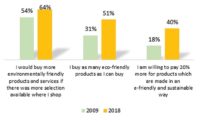As reported by Snack Food & Wholesale Bakery in its State of the Industry coverage, the U.S. bakery industry is valued at $51.6 billion in annual sales, and the U.S. snack industry sees sales of over $41.6 billion—and growing every year. We Americans love our sweets and snacks, and while continuing to enjoy them, many have also turned an eye to the health aspect of consuming all the snacks and baked good treats.
Sugar monitoring. Consumers are paying more attention to sugar content in their diet. According to NMI’s Health and Wellness Trends Database (HWTD), sugar monitoring has increased 20 percent over the past dozen years with almost 6 out of 10 consumers (59 percent) now watching the sugar content in their diet. Sugar amounts listed on package labeling is now the primary monitored ingredient, surpassing other scrutinized ingredients, such as calories, sodium, fat, high-fructose corn syrup and carbohydrates.
While consumers are concerned about sugar content, there continues to be a strong market for sweets and snacks, with nearly 6 out of 10 American adults (59 percent) describing themselves as “having a sweet tooth,” and 57 percent agreeing that they “have a sweet tooth and love sweet foods and beverages.” More than half of consumers report purchasing sweets such as cookies in the past 3 months, so despite the sugar monitoring, sweets are here to stay in the American diet.
By and large, “natural” foods have become part of the American diet. NMI research shows that three out of four consumers have used some type of natural or organic food in the past year. While table sugar is still the most-used sweetener, the use of table sugar has declined 22 percent over the past 10 years as consumers are opting for more natural options, such as honey and raw sugar. According to NMI HWTD, over the past decade consumers have increased their regular use of honey by 25 percent and raw sugar by 47 percent—and the use of stevia is up almost 5-fold in just 10 years.
As consumer interest in natural sweeteners increases, they are simultaneously shying away from artificial sweeteners. Research has shown that 37 percent of U.S. adults search for all natural noncaloric sweeteners rather than artificial sweeteners, up from 25 percent a decade ago. This presents an opportunity for snack producers and bakers to incorporate more natural sweeteners, such as honey, raw sugar, monk fruit and others.
Sustainability matters. The shift toward natural sweeteners also goes hand in hand with sustainable products. There is a close linkage between the concepts of natural and sustainable. Consumers are making the connection that a natural, and especially organic, product is often made in an environmentally friendly and sustainable manner. Consumers want to feel good about the foods they buy. This is especially true of millennials, a generation that has been raised with the ideals of personal and planetary health, and the benefits of purchasing environmentally friendly products.
Close to two-thirds (59 percent) of consumers prefer to buy products from manufacturers that use environmentally friendly packaging materials, and that use ingredients from farms that practice sustainable agriculture. One third (31 percent) are willing to pay more for products made in an environmentally friendly and sustainable way.
While consumers may not see what goes on behind the scenes in ingredient harvesting, formulation and product manufacturing, they do see the product packaging. Recent NMI research on consumer sustainability attitudes reveals that 71 percent of U.S. adults think many products are over-packaged. The fact that 30 percent of consumers may look for something else to buy when they see a product is over-packaged is cause to take note. One of the states taking note is California, which recently passed a bill calling for a 75 percent reduction in single-use plastics by 2030. It’s yet to be seen if other states will follow suit, but watch groups and legislators alike will be monitoring with respect to packaging in general.
Environmental friendliness and sustainability have implications for every aspect of the food industry, but the finished product itself is the consumer touchpoint. While corporate sustainability initiatives are important to consumer awareness and brand image, in the end, placement of a sustainably made product with environmentally friendly packaging provides consumers with a tangible reminder of a brand’s commitment to sustainability and the environment.




